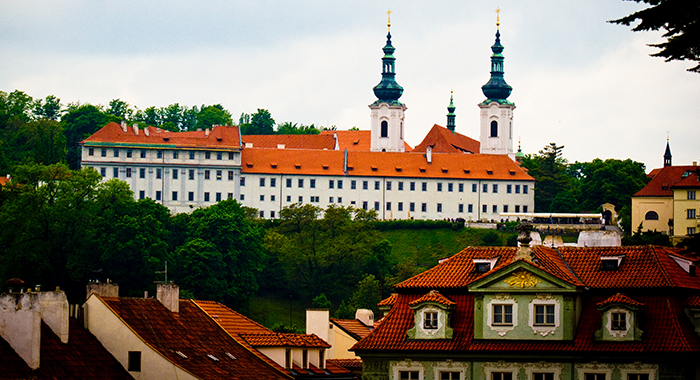Studying Remotely – Very Remotely – Connects Prague Norbertines With New Classmates
People across the globe have been scrambling to change plans due to the coronavirus. And while the pandemic has resulted in many disappointments, it hasn’t negatively impacted the seven international students taking online English as a Second Language (ESL) classes here at St. Norbert. In fact, the students and their teachers are excited with this new experience.
Typically, St. Norbert’s ESL classes run in eight-week blocks during the academic year, with two blocks per semester. There is also an eight-week summer course. The ESL students are a diverse international group, with some here for short learning sessions, while others study for two or three blocks, then enroll at SNC.
By mid-March, with programs completed and travel diminishing worldwide, the number of ESL students at St. Norbert had dwindled to three Vietnamese nuns: Sister Dung Nguyen (Sister Cecilia) and Sister Lan Nguyen (Dominican Sisters of Our Lady of the Rosary), and Sister Sach Kieu (Lovers of the Holy Cross of Hung Hoa). The three were studying English via the nonprofit organization Formation Support for Vietnam (FSVN). Jana Dettlaff (ESL Institute) says small groups of Vietnamese nuns have been traveling to SNC through this program for many years. The women take ESL classes at St. Norbert to improve their language skills, then move on to degree programs elsewhere in the U.S.
With the sisters needing to finish their studies, Dettlaff moved the spring semester’s second session online, and was joined by Christina Hankwitz (Center for Global Engagement) to continue the format for the summer.
Initially, it appeared the three nuns would be studying alone for both sessions. But serendipity gifted the trio four classmates: the Rev. Gregory Zacek and the Rev. Christian Psenicka, Norbertines of Strahov Abbey, Prague, in the Czech Republic; and Xuan Feng and Yishu Li, high school graduates from China.
Zacek and Psenicka had planned to study English on campus for five weeks this summer courtesy of St. Norbert Abbey, which often sponsors Norbertines from around the globe who wish to learn English. Typically, the men study on campus but stay at the abbey, where they’re integrated into the Norbertine community. COVID-19 canceled those plans, so the De Pere abbot offered them the chance to join the eight-week virtual summer school class instead. After some hesitation, the men signed on.
Feng and Li were attending high school in the greater Green Bay area and preparing for graduation when the coronavirus struck. Feng had already applied to St. Norbert, but wanted to use the summer to enhance his English language abilities. Li wanted to improve her English abilities before transitioning into regular classes. With the summer session a go, and Li unable to return home this summer as planned, the two signed on.
“It all just sort of happened,” says Dettlaff. Dettlaff and Hankwitz sprang into action, quickly constructing a new class format. And it’s been quite the success.
Kieu says the sisters were disappointed to be the only ones left in the second spring session. “But this [summer] semester, I am very happy and excited because we have new friends,” she says.
Dung Nguyen, whose name in religion is Sister Cecilia, is thrilled with how quickly her English skills are improving. “When I come here, I just say, ‘Hello, how are you?’ That’s it. So I’m very shy. Now I can write essays and I feel more confident.”
Although Zacek initially hesitated about studying online, and still hopes to come to the St. Norbert campus next summer, he says the courses are actually working well for the two men. “It is very exciting for us because it gives us a longer time to study,” he says, adding it also allows them to continue their Norbertine missions at home.
For Feng, online classes actually may be more helpful to him than traditional in-class sessions because of the intimate size and the fact that they’re virtual. “I’m a little bit nervous if I stand in front of many people,” he says. “If I give a speech, I’d be nervous and shake my body. But I’m fine talking in a small crowd. And this kind of [video] chat I feel better about.”
While Sister Cecilia Nguyen prefers studying in a traditional classroom, she says she’s been pleased with how well Zoom learning is working. She’s especially impressed with the platform’s breakout rooms, which allow students to separate into small work groups, then pop back into the full class. “I have to be surprised by learning through Zoom,” she says.
One of Dettlaff’s primary concerns had been the students’ different time zones, especially if Li had gone home to China. The Czech Republic’s time zone is seven hours ahead of that in De Pere, while China’s is 13 hours ahead. But with just two time zones to consider, that hasn’t proven to be an issue and everyone is thriving. “I didn’t think it would work as well as it is,” she says. “It’s been amazing.”
June 24, 2020












